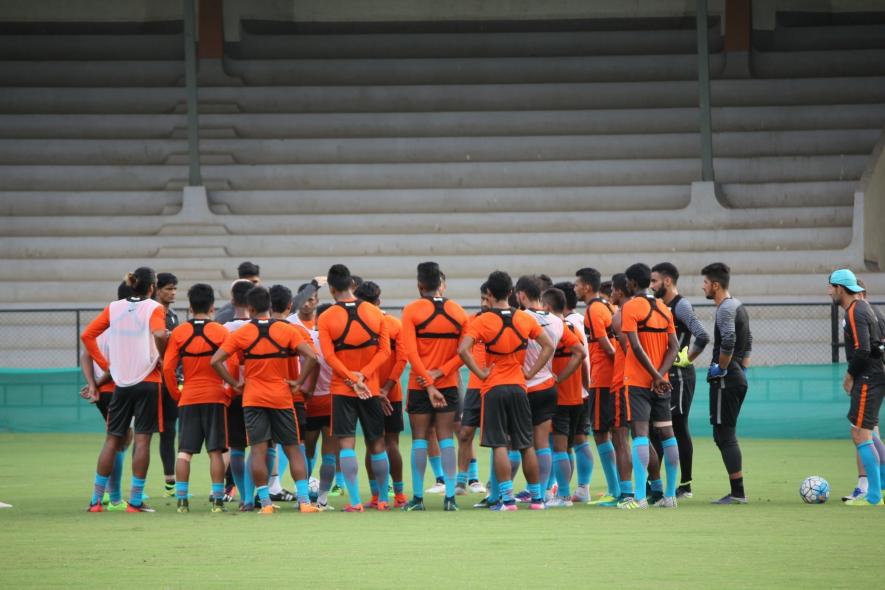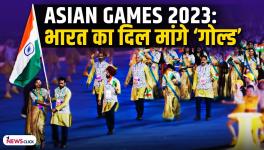No Indian Football Team at Asian Games; Blame Babus in IOA, AIFF

The Indian Olympic Association's (IOA’s) decision to not clear Indian football teams for the Asian Games has thrown AIFF into combat mode, and the blame games have begun (Pic: IANS).
It is common news by now that the Indian football teams (men and women) will not be participating at the Asian Games in Jakarta later this year. The IOA’s list of Indian athletes and the disciplines that the country will participate in glaringly omits footballers, citing a ‘failure to meet’ the criteria as the reason for the omission.
‘Quality and growth of Indian football compromised’ is the headline of a press release that has emerged from the AIFF’s PR machinery. The IOA’s decision has thrown this machinery into combat mode, and, appropriately enough, they have responded by going for the sword and not the shield.
There is a precedent for this situation. In 2014, under similar circumstances, it took special dispensation – and skillful persuasion – from AIFF president Praful Patel to ensure India went for the Games in Incheon.
READ MORE | Indian Football Team’s Asiad Outing in Limbo as IOA, AIFF Play ‘Approval’ Drama
This time, despite an upward swing in the rankings for the men, the IOA has refused to grant the AIFF their wish. India will not be represented in football at the Asian Games.
Try as they wish, the AIFF cannot frame this in a way where the IOA end up looking completely like the villains of the piece. Some blame must be shared.
Sideways passing
In a press conference on Sunday, AIFF General Secretary Kushal Das was asked about the fact that the AIFF had indicated that they were willing to pay for the expenses for the team, and the IOA need only sign their approval. Das’s response was ambiguous at best, but he agreed that the option existed, and they had offered such terms to the IOA.
Newsclick spoke to Rajeev Mehta, Secretary General, IOA, and Mehta’s stand on the matter was clear. “What is the team’s ranking? The guidelines are clear. If they are in top eight for teams and top six for individuals, they can go. It has never been about the money,” he said. While his stand on the matter is clear, it is difficult to say if he is privy to the AIFF’s complaints about the guidelines at all.
READ MORE | FIFA World Cup: The Life in Sudden Death
This is a depressing situation for the players, who must and should always be the centre of focus for any sport in any country. For the men’s team this is hardly the ideal situation. They have qualified for the AFC Asian Cup to be held in January 2019, and 11 of the players expected to be in that roster would have featured as part of the U23 Asian Games squad. Without clearance now, suddenly, the onus will lie on the AIFF to find them game time.
The women team have it worse off. A team that hasn’t played an international since July last year (a friendly against Malaysia), and has just concluded the first phase of a hassled and long overdue training camp is left with nothing to aim for. They have been left in the dark, and with another camp scheduled to be held later in the month – confirmation pending – their future is hard to predict.
Goalkeeper Aditi Chauhan expressed her frustrations best on Twitter. In a subsequent conversation it wasn’t too hard to see the disappointment stream through her voice. “As players, as professionals, a continental event is a big thing. We dream of going for this and for some it is the only opportunity you get to represent the country at a big stage,” she said, “taking that away is truly heartbreaking.”
“What is worse is the kind of signal this sends to young kids who want to perhaps play football and hope to play for India,” she says. “Now, looking at this situation, why would anyone encourage them to continue with their passion?”
READ MORE | FIFA World Cup, Dispatch from Russia (Ep 3): Pre-quarter Epics and a Prediction Game
Former India international Renedy Singh expresses similar dismay. “For junior teams, exposure to such tournaments and to quality opposition is important for their growth,” he says. “At the Asian Games, they would have played against teams such as Thailand, Vietnam, and, perhaps, one or more of the higher ranked teams like maybe Korea or Japan. It would go a long way in giving them an idea of where they stand.”
The IOA’s directive judges a team’s potential by its ranking. But the ranking directive itself – the AIFF will contest – is ambiguous when it comes to football. Traditionally India isn’t a footballing super power, and even in the continent, we are regarded as minnows.
And the reason for this is clear. The concept of the rankings itself is circular: to go up the rankings you have to play against those who are higher. To play against those higher you have to go to tournaments where they play. And, to play at those tournaments, you have to go up the rankings.
The blame sticks
Why blame the IOA for this situation alone? AIFF’s machinations and press bytes make it sound like they have been hoodwinked into this situation, the rug pulled underneath with someone brandishing a carrot in the sky. It couldn’t be further from the truth.
The truth is this. Despite the upward swing in rankings (only for the men, mind), youth teams get little or next to no exposure in competitive football. The women team’s plight has been well documented. Despite the increase in football’s profile in the country since 2014 -- the ISL only came about after the last edition of the Asian Games in Incheon -- there is very little they have done for the women’s game and for age-group teams.
READ MORE | Sunil Chhetri’s Appeal Is Much More Than a Mere Call for Fan Support
Consider the last time you saw the Indian women team play a match on live television? In 2014 undoubtedly. When they took the field at the Asian Games.
By putting all their eggs in the Asian Games basket, the AIFF have sought to absolve themselves of blame for lack of competitive game time in the past.
While Renedy agrees with the idea that the AIFF should also share the pressure of doing more in terms of organising fixtures and competitive matches for the teams, he still feels that denying them an Asian Games opportunity is disastrous. “It is definitely a bad look when your team hasn’t played an international in almost a year. There is no chance of growth in that situation, we shouldn’t even be discussing it,” he says.
“But additionally,” he adds, “when a competition like the Asian Games has presented itself, and India have been invited to be a part of it, then it makes sense to go send the team, no?” he says. “Organising competitive fixtures is a time consuming and expensive effort. Here the organising part is done, so then why deny the team a chance? Exposing a young squad to a high quality competitive tournament will reap dividends in the future.”
Perhaps it is apt then to consider Chauhan’s words right at the end, to truly understand the mess that Indian sports can sometimes be. “Ideally, you would expect all parties to come together and work towards bettering the situation. But, apparently not. Here everyone works on their own, and the players are then expected to play as a team.”
Get the latest reports & analysis with people's perspective on Protests, movements & deep analytical videos, discussions of the current affairs in your Telegram app. Subscribe to NewsClick's Telegram channel & get Real-Time updates on stories, as they get published on our website.
























